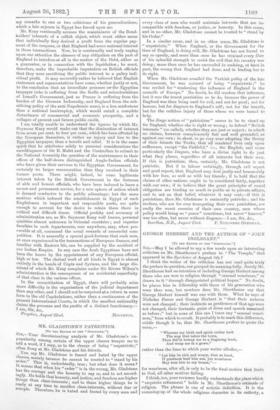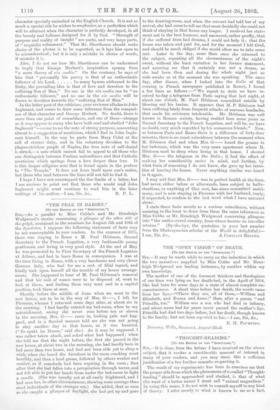GEORGE HERBERT AND THE AUTHOR OF "JOHN INGLESANT."
[To THE EDITOR Or THE " SPEOTATOR.1 Sin,—May I be allowed to say a few words upon an interesting criticism on Mr. Shorthouse's preface to "The Temple," that appeared in the Spectator of August 5th
1 think the writer of the criticism has not read quite truly the preface in question, nor grasped its meaning fully. Surely Mr. Shorthouse had no intention of including George Herbert among those who are won to religion through "sensual weariness," or drawn to it "through disappointed political hopes." No doubt, he places him in fellowship with those of his generation who were thus won, but nowhere does Mr. Shorthouse say that George Herbert himself was one with them. What he says of Nicholas Ferrar and George Herbert is "that their natures were not changed ; their instincts as gentlemen of that age were not changed, their fantastic guise of dross and speech remained as before ;" but in none of this can I trace any "sensual weari- ness," from which to revolt. It probably is to mark this difference,
subtle though it be, that Mr. Shorthouse prefers to quote the verse,—
"Whereas my birth and spirit rather took The way that takes the town, Thou didist betray me to a lingering book, And wrap me in a gown."
rather than the lines to which your writer alludes,—
" Let him be rich and weary, that at least, If goodness lead him not, yet weariness May toss him to my breast,"—
for weariness, after all, is only to be the final motive that leads to God, all other motives failing.
I think, too, your reviewer hardly understands the place which "exquisite refinement" holds in Mr. Shorthouse' e estimate of religion. The phrase is one of artistic definition. It is the summing-up of the whole religious character in its entirety, a character specially embodied in the English Church. It is not so much a special side he wishes to emphasise, as a perfection which will be attained when the character is perfectly developed, in all the beauty and fullness designed for .it by God. "Strength of purpose and reality of insight" are parts, and very large parts, of " exquisite refinement." That Mr. Shorthonse should make choice of the phrase is to be regretted, as it lays him open to be misunderstood; but it is only a mistake in choice of words, if mistake it is.
Also, I do not see how Mr. Shorthouse can be understood to imply that George Herbert's inspiration sprang from "a mere theory of via media." On the contrary, he says of him that "personally his poetry is that of an enthusiastic follower of his Lord In many hymns addressed to the Deity, the prevailing idea is that of love and devotion to the suffering Son of Man." No one in the via media can be "an enthusiastic follower," and no one in the via media will he drawn to devotion towards the "suffering Son of Man."
In the latter part of the criticism, your reviewer alludes to John. Inglesant, and seems to draw some inference from the compari- son of that character and George Herbert. No doubt, there is more than one point of resemblance, and one of these—strange as it may appear to many who have both read and studied "John Inglesant "—seems to me the note of strong purpose, amounting almost to a suggestion of asceticism, which I find in John Ingle- sant himself. In the way he parts from Mary Colet at the call of sterner duty, and in his voluntary devotion to the plague-stricken people of Naples, the true note of self-denial is struck,—a note which cannot fail to appeal to all those who can distinguish between Puritan unloveliness and that Catholic asceticism which springs from a love deeper than fear. It is this deeper religious note that is found again in the preface to "The Temple." It does not force itself upon one's notice, but those who read between the lines will not fail to find it.
I hope I have not overstepped the due limits of a letter, but I am anxious to point out that those who would read John Inglesaut aright must continue to read him in the later writings of his author.—I am, Sir, Sm., B. P. L.































 Previous page
Previous page